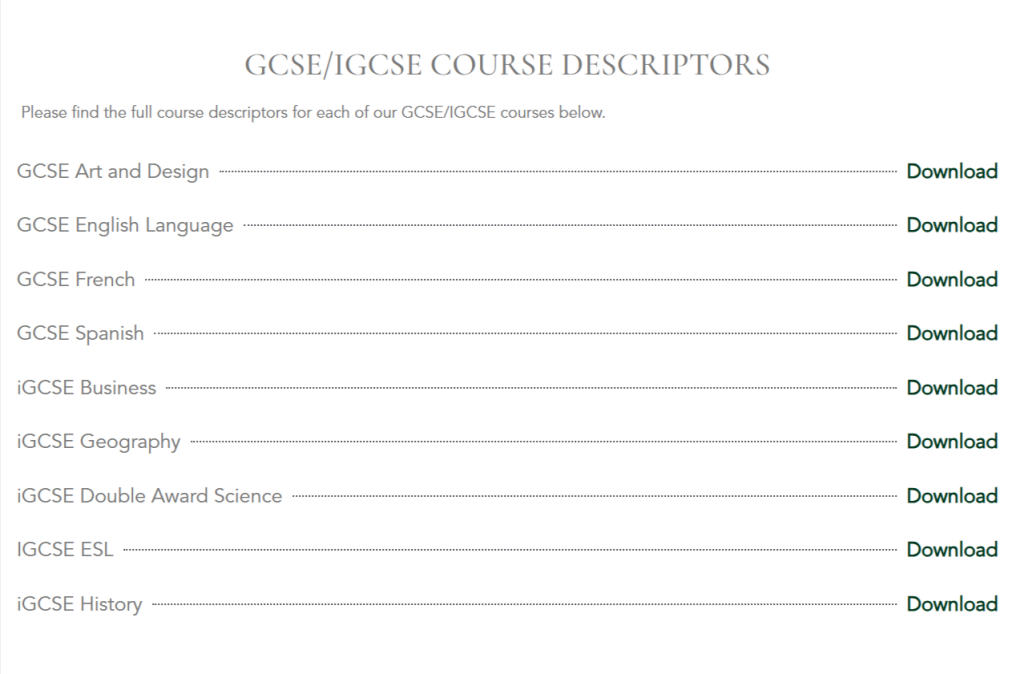GCSE
GCSEs are the perfect preparation for A level or IB
Home » Curriculum » GCSE
GCSE Facts
The General Certificate of Secondary Education (GCSE) provide students with a high-quality secondary education foundation which offers progression to A level, UFP or IB.
Ages:
14+
Average Class Size:
15
Tuition Fees for International:
£35,115
Entry Requirements:
At least 8 years of schooling with a good school record for our two-year programme
Hours per week:
30+
Tuition Fees for EU:
£28,880
Language Requirements:
IELTS 3.5+ (or equivalent)
Course duration:
6 terms (September start)
5 Terms (January start)
Tuition Fees for UK:
£19,820
Why study GCSE at Worthgate?
42%
of students achieved at least one A*-A grades
44%
of Maths grades are A*-A
50%
of History grades are A*
“GCSE and IGCSE offer students a variety of subjects with an academic focus on their English as well, so is excellent for international students as a starter in the UK education system.”
Vice Principal
Dr. Nicola Robinson
GCSE Overview
At The Worthgate School students can join Year 10 in both September and January to study our GCSE course. Classes are taught by subject specialists who are trained in how to teach students who have English as a second language. The qualification encourages students to explore their academic potential and discover where their interests lie. The qualification is internationally recognised and is normally obtained after two years of study.
GCSE Qualifications in a wide range of subjects
Improved subject knowledge for university preparation programmes
English fluency and proficiency ready for university preparation programmes
Enhanced study skills required to excel in a chosen university preparation programme
Builds personal confidence and independence
Improved collaborative skills
GCSE Subject Choices
English, Maths, Business, Biology, Chemistry and Physics are all compulsory subjects taken as part of the GCSE course. Students must select three more subjects, one from each block:
September Start Subjects
Block A
Art
Computing
Block B
Classics
Geography
Block C
French
History
Spanish
GCSE Course descriptors
Please find the full course descriptors for each of our GCSE courses in our Student Hub. They entail:
- Subject Overview
- Prior Learning Requirements
- Exam Board Information
- Course Content
- Assessment
- Textbooks/Revisions Guides
- Higher Education Pathways
- Complementary Subjects of Study

Questions about GCSE
These programmes let you study a range of subjects that give you a good base knowledge before you go on to study in more detail. GCSEs are the standard route to further study, and ultimately to university, in the UK. All the top universities recognise the programme, and they are even widely recognised internationally by some of the best institutions across the world.
GCSEs are ideal for all students aged 14 onwards, in some instances students aged 13+ are considered. The programme allows you to study a range of subjects, and gives you the right preparation for your further study.
The GCSE programme is one of the ways that you can further your study in the UK and eventually enter university and study for an undergraduate degree. After you have finished GCSE you will normally have two years of high school left.
GCSEs are widely recognised by employers across the world. High grades are a great way for you to show that you can perform consistently and meet high academic standards. You’ll also learn how to study, ready to go on to A level, IB or UFP
Students take a mixture of internal and external examinations. The main external exams take place in the summer term at the end of your GCSE course. To ensure students are well prepared we provide mock exams to aid in exam practice and preparation and to help teachers identify any areas needing improvement. English is also examined and awarded through IGCSE First Language English with an International English Language Testing System (IELTS) examination. Some subjects (such as the sciences) have an element of coursework which is written or practical work completed throughout the year and counts towards the overall grade.
GCSE results are published in June and August. Grades range from 9 (the highest possible grade, equivalent to A*) down to grade 1 and then finally to U (the lowest grade), although a ‘good pass’ is considered anything from 9 to 4.
